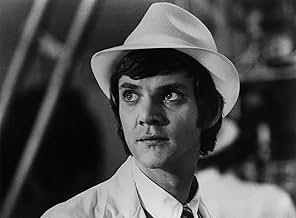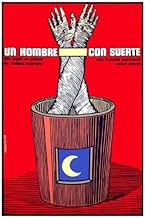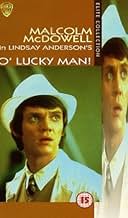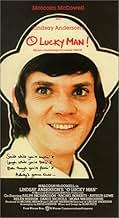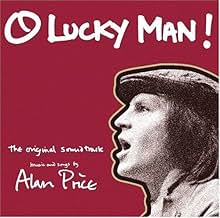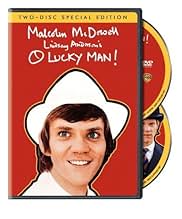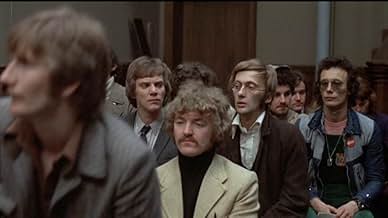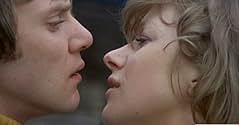NOTE IMDb
7,6/10
9,1 k
MA NOTE
Un vendeur de café ambitieux a une série d'aventures improbables et ironiques qui semblent conçues pour défier son idéalisme naïf.Un vendeur de café ambitieux a une série d'aventures improbables et ironiques qui semblent conçues pour défier son idéalisme naïf.Un vendeur de café ambitieux a une série d'aventures improbables et ironiques qui semblent conçues pour défier son idéalisme naïf.
- Réalisation
- Scénario
- Casting principal
- Victoire aux 2 BAFTA Awards
- 3 victoires et 2 nominations au total
Mary MacLeod
- Mary Ball
- (as Mary Macleod)
- …
Avis à la une
There is something intriguing about this film. It won't suit everybody, but if you are in a reflective mood you'll find yourself drawn into the story and becoming fascinated by it.
It is a journey through life and its experiences directed with a deftness and real respect for the material. The points are all made with a lightness which somehow makes them all the more effective. You watch the story unfold and are reminded of your own life's progression.
Malcolm McDowell contributed to the script and is just superb in the lead role. He uses exactly the right touch in a perfectly judged performance - it is difficult to imagine anybody else in this part.
A classic often overlooked by mainstream film critics.
It is a journey through life and its experiences directed with a deftness and real respect for the material. The points are all made with a lightness which somehow makes them all the more effective. You watch the story unfold and are reminded of your own life's progression.
Malcolm McDowell contributed to the script and is just superb in the lead role. He uses exactly the right touch in a perfectly judged performance - it is difficult to imagine anybody else in this part.
A classic often overlooked by mainstream film critics.
10miloc
This remarkable, often overlooked film deserves a higher critical reputation than it has largely received. It represents a blossoming of the themes introduced in "if..." (the previous film in Anderson's trilogy) and a playful, even strangely upbeat reworking of those ideas.
"if..." was an explosion of the subconscious, repression fermenting into fantasized revolution; in "O Lucky Man!" the repression has matured into deep, abiding social, political, and economic corruption-- but the fantasies have matured as well. Mick Travis's journey through early '70s England features calamity after calamity, atrocity piled onto atrocity, but it feels lighter than air. It rises like a joke-filled balloon. That vantage point gives the viewer the two advantages unavailable to Travis: wisdom and perspective, and the film's humor comes from the distance between us and the characters scurrying below. (But the film is not, I think, cynical; the road to enlightenment may be hard one but the film makes it clear that it's not unreachable.)
Surrounding Malcolm McDowell's indefatigable Candide of a hero, the supporting cast flows in and out of their multiple roles like a comic repertory company, in which the same actors show up in scene after scene shuffled into a new assortment of scoundrels, con-artists, victims and sages, climaxing (don't worry, I'm not going to spoil it) in a beautiful, subtle joke which has to be seen to be understood.
From the silent-movie pastiches through Price's terrific songs (the music is used admirably) through wild, spontaneous moments of parody, uninhibited symbolic flourishes, and a few small scenes of genuine poignancy, "O Lucky Man!" deserves to be recognized as one of the great films of the 1970s, and perhaps of all time. It's certainly one of my personal favorites. Movies, I think, though bigger than ever, have become smaller and smaller at heart; more films should have the ambitions this film does and deliver on so many of them.
"if..." was an explosion of the subconscious, repression fermenting into fantasized revolution; in "O Lucky Man!" the repression has matured into deep, abiding social, political, and economic corruption-- but the fantasies have matured as well. Mick Travis's journey through early '70s England features calamity after calamity, atrocity piled onto atrocity, but it feels lighter than air. It rises like a joke-filled balloon. That vantage point gives the viewer the two advantages unavailable to Travis: wisdom and perspective, and the film's humor comes from the distance between us and the characters scurrying below. (But the film is not, I think, cynical; the road to enlightenment may be hard one but the film makes it clear that it's not unreachable.)
Surrounding Malcolm McDowell's indefatigable Candide of a hero, the supporting cast flows in and out of their multiple roles like a comic repertory company, in which the same actors show up in scene after scene shuffled into a new assortment of scoundrels, con-artists, victims and sages, climaxing (don't worry, I'm not going to spoil it) in a beautiful, subtle joke which has to be seen to be understood.
From the silent-movie pastiches through Price's terrific songs (the music is used admirably) through wild, spontaneous moments of parody, uninhibited symbolic flourishes, and a few small scenes of genuine poignancy, "O Lucky Man!" deserves to be recognized as one of the great films of the 1970s, and perhaps of all time. It's certainly one of my personal favorites. Movies, I think, though bigger than ever, have become smaller and smaller at heart; more films should have the ambitions this film does and deliver on so many of them.
I have seen both versions (there was an edited version in the late seventees that did not include the rescue scene) of "O Lucky Man" several times. I first saw it in London in the mid seventees as I was very impressed by Lindsay Andersons earlier "If", not to mention a fine performance by Malcolm McDowell. The surreal quality of of Andersons allegorical perspective of life in England at the time was reflected in one of the films great lines, "Try not to die like a dog?" Having seen the film several times since (and turned some friends onto Lindsey Anderson), I was truly surprised at how this film has, not only, not dated, but actually has more relevance now than it did some 27 years ago. England, was about to undergo radical changes in both government and economy. The naivety of the care free sixties was well behind us. Major strikes were frequent. Punk was about to explode onto an exhausted music scene. And, soon there would be a new regime of economic rationalists running the country. The mood and pace of "O Lucky Man" seemed to reflect a sense of innocence lost. Troubled times ahead. A sense of fear and mistrust of the prosperity that is so often associated with capitalism and free enterprise. There are even blatant stabs at genetic engineering. But most of all the sense that England was no longer in control of it's own destiny. Through out this vision of uncertainty are some of last centuries finest comic performances. Most notably Aurthur Lowes' 'Dr. Munda' was, and still is, brilliant. WARNING!!! Even though this film does not follow the normal codes and conventions of narrative structure, my next comment is about a scene towards the end of the film. So, if you have not seen "O Lucky Man", but would like to, stop reading now. The best line of all that sums up the mood of this film is delivered by Mick Travis during the audition scene. After being slapped in the face by Lindsay Anderson when he was told to 'smile', he looks straight at the camera, sneers, and says, "What's there to smile about?". All these years later, still brilliant.
It became my favorite film the day I saw it for the first time, 22 years ago! It still is. I saw it again on video a week ago and here it is, traveling through my brain as a familiar song with constant new messages. Malcolm McDowell and Lindsay Anderson had blown us away with "If..." a couple of years before. But if "If..." was the courting, marriage and honeymoon of two great artists, "O Lucky Man" is a confirmation of a great love story. I know there are a few other members of this menage, David Sherwin for instance or the amazing group of superb British character actors from Mona Washbourne to Helen Mirren but the incomparable presence of McDowell inhabiting Anderson's universe makes this "O Lucky Man" one of the happiest movie adventures of my movie going life. As you may have noticed, I haven't told you anything about the film, I just wanted to share my thoughts hoping to wet your appetite. If you haven't seen it, don't miss it.
To see this film again has been a monumental thrill. Lindsay Anderson, what an extraordinary director. IF. THIS SPORTING LIFE. BRITANNIA HOSPITAL. THE WHALES OF AUGUST. So very few films, but each one of them, a journey of discovery. Entertaining but angry and provoking. His repertory of actors, from Malcolm McDowell his star and, I imagine, his lover to Arthur Lowe. The Anderson-McDowell collaborations deserve an in depth study. Very rarely a director and actor can bring such glories from each other. De Niro and Scorsese. Von Stemberg and Dietrich. Kazan and Brando and very few others. The joys of Rachel Roberts, Ralph Richardson, Helen Mirren, Mona Washbourne and a cast of a thousand glorious British character actors. The film is so filled with surprises that you don't want ever to end.
Le saviez-vous
- AnecdotesAfter the success of If.... (1968), Malcolm McDowell suggested to producer and director Lindsay Anderson that they should work again. Anderson replied that good scripts don't grow on trees, and that McDowell should consider writing his own if he wanted to give himself a good part. Although McDowell was only thirty at the time, he based this movie around the concept of his own life story, and then brought it to David Sherwin, who then crafted the screenplay.
- GaffesA sign says 200 miles to London where Travis is picked up. He has reached there by walking for a while from the military establishment where the explosion took place. The distance even from London to the border of Scotland is 398 Miles.
- Versions alternativesThe original US release was cut by twenty or more minutes, the entire sequence involving the suicidal woman, roughly from Mick's release from prison until he meets the charity tea-wagon lady was omitted. (This included one of Alan Price's songs)
- ConnexionsFeatured in Free Cinema (1986)
- Bandes originalesO Lucky Man!
Written by Alan Price
Meilleurs choix
Connectez-vous pour évaluer et suivre la liste de favoris afin de recevoir des recommandations personnalisées
- How long is O Lucky Man!?Alimenté par Alexa
Détails
Box-office
- Montant brut mondial
- 332 $US
- Durée2 heures 58 minutes
- Mixage
- Rapport de forme
- 1.85 : 1
Contribuer à cette page
Suggérer une modification ou ajouter du contenu manquant

Lacune principale
By what name was Le Meilleur des mondes possible ! (1973) officially released in India in English?
Répondre

